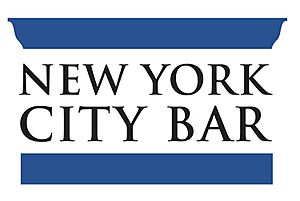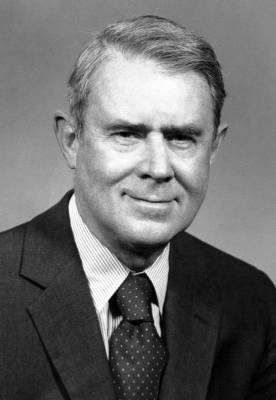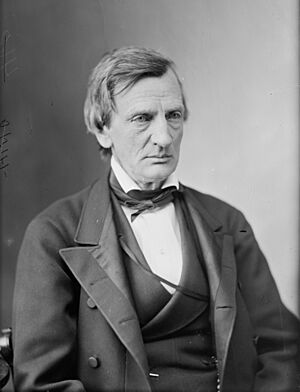New York City Bar Association facts for kids
 |
|
| Formation | 1870 |
|---|---|
| Type | Legal society |
| Headquarters | New York City, New York |
| Location |
|
|
President
|
Sheila S. Boston |
The New York City Bar Association (often called the City Bar) is a group of lawyers and law students. It was started in 1870. Since 1896, the organization has been in a special, historic building. This building is on 44th Street in Manhattan, New York City. Today, the City Bar has over 25,000 members. Its current president is Sheila S. Boston. She started her two-year job in May 2020.
Contents
History of the City Bar

The New York City Bar Association was created in 1870. People were worried about unfairness among judges and lawyers in New York City. Some of its first leaders, like William M. Evarts and Samuel J. Tilden, worked to remove unfair judges. They also helped to bring down the famous Tweed Ring, a group known for corruption. Many important lawyers in the country were part of this group. These included Elihu Root and Charles Evans Hughes.
By the 1960s, the City Bar became more open to everyone. It made it easier to join. It also started working on important social issues. For example, it welcomed Dr. Martin Luther King Jr. and Chief Justice Earl Warren. The group also strongly supported ideas like the Equal Rights Amendment. This amendment aimed to make sure everyone had the same rights.
Since the 1980s, the City Bar has worked to include more women and people from different backgrounds. It also helps people get legal help if they can't afford it. They work on international human rights. They also offer free legal help for people dealing with immigration, AIDS, and homelessness.
Since 1896, the City Bar has been in its special six-story building. This building is located at 42 West 44th Street.
What the City Bar Does
Committees and Public Policy
The City Bar has more than 160 committees. These groups focus on different areas of law and important issues. They write reports, give advice to courts, and send letters. This way, the City Bar shares its ideas on public rules and new laws. The City Bar's Policy department helps connect these committees with lawmakers. These lawmakers are in the New York State Legislature and the New York City Council.
Here are some examples of what these committees work on:
Business and Company Rules
- They wrote a report about agreements between company owners. (February 2010)
- They gave advice to the Obama team about money rules. (December 2008)
Civil Rights and Safety
- They sent a letter to U.S. Senators. They did not agree with a part of a law about national defense. This part would have looked into lawyers helping people held at Guantanamo detention camps. (May 2010)
- They gave advice to the U.S. Supreme Court in a case called Hamdan v. Rumsfeld. (January 2006)
- They wrote a report about holding "enemy combatants" without a trial. They looked at fairness and national safety during the War on Terrorism. (February 2004)
Consumer Issues
- They wrote a report asking for changes to how legal papers are delivered in New York City. (May 2010)
- They supported a law to protect people better when they owe money. (April 2010)
Government Changes
- They shared their ideas for new state laws in 2014. (February 2014)
- They wrote a report about rules for lawmakers in New York State to share their money information. (February 2010)
- They wrote a report about agreements for community benefits in New York City. They wanted the city to have clear rules for these agreements. (March 2010)
- They pointed out issues for the New York City's Charter Revision Commission to fix. (April 2010)
International Work
- They wrote a report after a trip to China. (December 2009)
- They wrote a report about an international agreement on choosing courts. (September 2006)
- They wrote a report about preventing and prosecuting acts of terrorism. (June 2006)
- They wrote a report on human rights rules for how the United States questions people it holds. (April 2004)
Special Events and Speakers
The City Bar holds many events each year. Most are through its committees. Some famous events include:
- Supreme Court Justices Ruth Bader Ginsburg and Sonia Sotomayor were interviewed. (October 25, 2016)
- Sally Yates, a former U.S. Deputy Attorney General, gave a speech. (May 10, 2016)
- United Nations Secretary-General Ban Ki-moon spoke about global goals for a better future. (April 2016)
- Supreme Court Justice Elena Kagan gave a speech about Justice Ruth Bader Ginsburg. (February 2014)
- A meeting was held with people running for New York City Mayor. This included future Mayor Bill de Blasio. (June 2013)
- Chen Guangcheng, a Chinese legal activist, was made an honorary member. (February 2013)
- Harold Hongju Koh, a former legal advisor for the U.S. Department of State, gave a speech. (November 2012)
- Hon. Louise Arbour was made an honorary member. This was for her brave work for justice. (May 2012)
- The first free legal clinic for the September 11th Victim Compensation Fund was held. (November 2011)
- Michelle Bachelet, a leader from the United Nations, spoke about progress for women. (June 2011)
- Leaders from many New York legal groups met. They asked for laws to end unfairness against same-sex couples who want to marry. (May 2011)
- Preet Bharara, a U.S. Attorney, gave a speech about fighting financial crimes. (October 20, 2010)
- Retired U.S. Supreme Court Justice Sandra Day O'Connor spoke about fair judges and learning about government. (April 5, 2010)
- Robert Khuzami, a director from the Securities and Exchange Commission, gave a major speech. (August 5, 2009)
- Journalist Linda Greenhouse gave a speech about Justice Ruth Bader Ginsburg. (November 18, 2008)
- Former Chief Justice Iftikhar Muhammad Chaudhry of Pakistan was made an honorary member. This was for his work for fair judges. (November 17, 2008)
- John Lennon held a press conference. He talked about the U.S. government trying to send him out of the country. (April 1, 1973)
- Dr. Martin Luther King Jr. gave a speech about the Civil Rights Movement. (April 21, 1965)
Learning for Lawyers
The City Bar Center for Continuing Legal Education helps lawyers keep learning. It offers over 150 live programs each year. It also provides videos and audio recordings. These help lawyers in New York, New Jersey, California, and Illinois stay updated.
Free Legal Help for All
Through its related groups, the City Bar Justice Center and the Cyrus R. Vance Center, the City Bar gives free legal help. This is called pro bono work. They help people in New York City who cannot afford a lawyer. They also help other countries start their own free legal aid programs.
Finding a Lawyer
The New York City Bar Legal Referral Service (LRS) helps people find lawyers. It is the oldest service of its kind in New York State. It is a non-profit group. Lawyers at the LRS answer calls and online requests. They help people decide if they need a lawyer. They can also suggest other helpful resources. It costs nothing to talk to an LRS lawyer. The LRS also has a "Monday Night Law Program." This offers free talks with lawyers on different legal topics. They also have a "Request a Speaker" program. This provides lawyers to give free talks to groups or schools.
Choosing Judges
The City Bar's Judiciary Committee looks at people who want to become judges. They decide if a person is "Approved" or "Not Approved." This is for judges in New York City's courts.
Other committees also look at candidates for New York's highest court, the New York Court of Appeals. They say if a person is "Well Qualified," "Not Well Qualified," or "Exceptionally Well Qualified."
The City Bar also looks at people the President chooses for the U.S. Supreme Court. They decide if a person is "Qualified," "Unqualified," or "Highly Qualified."
National Moot Court Competition
Since 1950, the City Bar has held the National Moot Court Competition. This is a competition for law students. Over 150 law schools from across the United States take part each year. The final rounds are held at the City Bar's building.
Awards Given by the City Bar
Association Medal
This award started in 1951. It is given to a lawyer in New York who has done amazing things for the legal community. The first medal was given to Hon. Robert P. Patterson in 1952.
Bernard Botein Medal
The Bernard Botein Medal is given every year to court staff. It is for their great work in helping the courts run smoothly. This award remembers Bernard Botein. He was a former judge and a past president of the City Bar.
Henry L. Stimson Medal
The Henry L. Stimson Medal is given every year to excellent Assistant U.S. Attorneys. These are lawyers who work for the government in New York. The medal honors Henry L. Stimson. He was a U.S. Attorney and a past president of the City Bar.
Thomas E. Dewey Medal
The Thomas E. Dewey medal is given every year to an outstanding Assistant District Attorney in each of New York City's offices. Thomas E. Dewey was known for hiring professional lawyers to work in the District Attorney's office. He was famous for successfully going after criminals in the 1930s.
Minority Fellowship in Environmental Law
This program helps minority law students learn about environmental law. It gives them money for summer jobs in government or non-profit groups. This helps more diverse students get into this field.
Thurgood Marshall Fellowship
The Thurgood Marshall Fellowship Program started in 1993. It gives three outstanding minority law students a chance to work with the City Bar. They help to promote civil rights and equal justice. This honors the legacy of Thurgood Marshall.
Legal Services Awards
These awards recognize lawyers who give important free legal help. They help people in New York City who are in need.
Katherine A. McDonald Award
The Katherine A. McDonald Award honors lawyers who do vital work in the Family Court in New York City.
Municipal Affairs Awards
These awards recognize great work by Assistant Corporation Counsel. These are lawyers who work for the city government.
Who Leads the City Bar
The City Bar is led by its President and an Executive Committee. This committee includes the president, three vice presidents, a treasurer, a secretary, and 16 other members. The president serves for two years. The Executive Committee members serve for four years.
City Bar Presidents
- Sheila S. Boston: 2020–present
- Roger Juan Maldonado: 2018–2020
- John S. Kiernan: 2016–2018
- Debra L. Raskin: 2014–2016
- Carey R. Dunne: 2012–2014
- Samuel W. Seymour: 2010–2012
- Patricia M. Hynes: 2008–2010
- Barry M. Kamins: 2006–2008
- Bettina B. Plevan: 2004–2006
- E. Leo Milonas: 2002–2004
- Evan A. Davis: 2000–2002
- Michael A. Cooper: 1998–2000
- Michael A. Cardozo: 1996–1998
- Barbara Paul Robinson: 1994–1996
- John D. Feerick: 1992–1994
- Conrad K. Harper: 1990–1992
- Sheldon Oliensis: 1988–1990
- Robert M. Kaufman: 1986–1988
- Robert B. McKay: 1984–1986
- Louis A. Craco: 1982–1984
- Oscar M. Ruebhausen: 1980–1982
- Merrell E. Clark Jr.: 1978–1980
- Adrian W. DeWind: 1976–1978
- Cyrus R. Vance: 1974–1976
- Orville H. Schell Jr.: 1972–1974
- Bernard Botein: 1970–1972
- Francis T. P. Plimpton: 1968–1970
- Russell D. Niles: 1966–1968
- Samuel I. Rosenman: 1964–1966
- Herbert Brownell: 1962–1964
- Orison Marden: 1960–1962
- Dudley B. Bonsal: 1958–1960
- Louis M. Loeb: 1956–1958
- Allen T. Klots: 1954–1956
- Bethuel M. Webster: 1952–1954
- Whitney North Seymour: 1950–1952
- Robert P. Patterson: 1948–1950
- Harrison Tweed: 1945–1948
- Allen Wardwell: 1943–1945
- William D. Mitchell: 1941–1943
- Samuel Seabury: 1939–1941
- Henry L. Stimson: 1937–1939
- Clarence J. Shearn: 1935–1937
- Thomas D. Thacher: 1933–1935
- John W. Davis: 1931–1933
- Charles Culp Burlingham: 1929–1931
- Charles Evans Hughes: 1927–1929
- William D. Guthrie: 1925–1927
- Henry W. Taft: 1923–1925
- James Byrne: 1921–1923
- John G. Milburn: 1919–1920
- George L. Ingraham: 1917–1918
- George W. Wickersham: 1914–1916
- William B. Hornblower: 1913–1914
- Lewis Cass Ledyard: 1912
- Francis Lynde Stetson: 1910–1911
- Edmund Wetmore: 1908–1909
- John L. Cadwalader: 1906–1907
- Elihu Root: 1904–1905
- William Gardner Choate: 1902–1903
- John E. Parsons: 1900–1901
- James C. Carter: 1897–1899
- Joseph Larocque: 1895–1896
- Wheeler H. Peckham: 1892–1894
- Frederic René Coudert Sr.: 1890–1891
- Joseph H. Choate: 1888–1889
- William Allen Butler: 1886–1887
- James C. Carter: 1884–1885
- Francis N. Bangs: 1882–1883
- Stephen P. Nash: 1880–1881
- William M. Evarts: 1870–1879
See also
 In Spanish: Asociación de Abogados de la Ciudad de Nueva York para niños
In Spanish: Asociación de Abogados de la Ciudad de Nueva York para niños
 | Janet Taylor Pickett |
 | Synthia Saint James |
 | Howardena Pindell |
 | Faith Ringgold |


